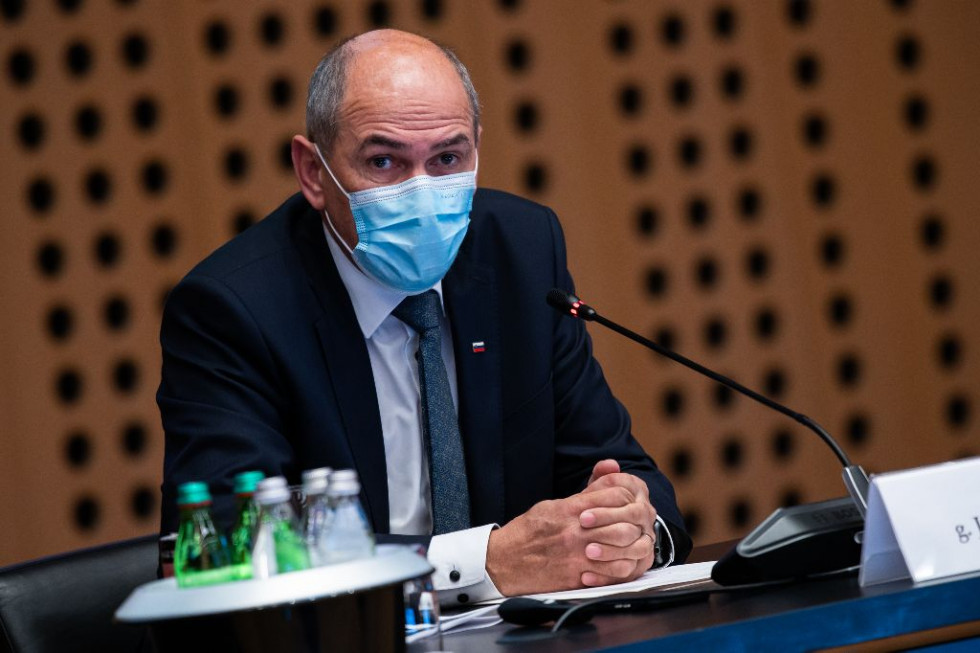Prime Minister Janez Janša at the 1st meeting of the Strategic Council on Social Policy
- Former Prime Minister Janez Janša (2020 - 2022)

Prime Minister Janez Janša at the 1st meeting of the Strategic Council on Social Policy | Author KPV
Prime Minister Janez Janša first thanked the President and the members for their cooperation and participation in the first meeting of the Council. He then presented some data indicating the position of Slovenia. According to unemployment indicators, Slovenia is among the most successful in the European Union. With the adopted measures, Slovenia has saved more than 200,000 jobs, which indicates that these measures have "worked". "Jobs are not only maintained for the time of the epidemic, but we have also maintained jobs that can remain after the epidemic."
He also pointed out that the European Summit in Porto, Portugal, also tried to provide answers to social policy questions last week. He also spoke about unemployment in bilateral meetings with the prime ministers of Greece and Spain. According to the data on unemployment in Slovenia that we have less than 78,000 unemployed, they said that "Slovenian unemployment is not unemployment, but full employment", that this is a situation that will not be achieved in Greece and Spain in the next fifteen years. He said that there is a trend in areas of unemployment that we hoped would continue.
Economic forecasts show that Slovenia is among those countries that are estimated to have survived the epidemic better so far, and will already be able to compensate for the decline in economic growth this year. In 2021 and 2022, Slovenia will have one of the highest economic growth rates and one of the lowest unemployment rates in the European Union. He said that significant European funds will also be available, which would be an additional generator of growth which is the base of our social model and a generator of all social indicators.
The Prime Minister reminded that various, even contradictory, assessments of the situation had been made at the European Social Summit in Portugal. Despite the differences between the Member States, according to the Prime Minister, there is a common denominator. This is the European social model, which is one of the fundamental pillars of what we call the European way of life. He said that we and the European Union are faced with a fundamental dilemma whether the European social model is also sustainable in terms of the demographic image and the green digital transition. In order to go green and digital, and to preserve the characteristics of the European social model, we need to get used to the changes that are in both European and our own strategic documents. He pointed out that the key changes will be in the field of education, and the way of life will also change.
The Prime Minister then highlighted that social dialogue is also one of the key pillars of the European way of life. Europe swears by the social market economy which demands social dialogue. Social dialogue means that employers and employees are on two sides that need to talk and coordinate, but cannot take on the role of each other. According to the Prime Minister, when it comes to blending roles, this is no longer a dialogue, but a conflict. It is essential that the roles are clear and that compromises need to be made, while the goal is the same. He expressed surprise that some trade unions are leaving the Economic and Social Council, despite the fact that much attention has been paid to this area during this term, much more than in the previous six years. Despite this, and the fact that the government has devoted considerable resources to mitigate the effects of the epidemic, there have never been such harsh words as now.
The green and digital transition will also have a decisive impact on social policy. Slovenia is in many areas above the European average, while the "grey image" is the result of older people with low pensions. We must pay special attention to this category of people in need, the Prime Minister pointed out.
At the end of his speech, he expressed joy over the goals set by the Strategic Council. In his opinion, a fair assessment of Slovenia's position and all possible changes must be made in order to obtain a simpler, more transparent and fairer social system. The government is already regulating the field of long-term care, and will soon discuss the respective law.
